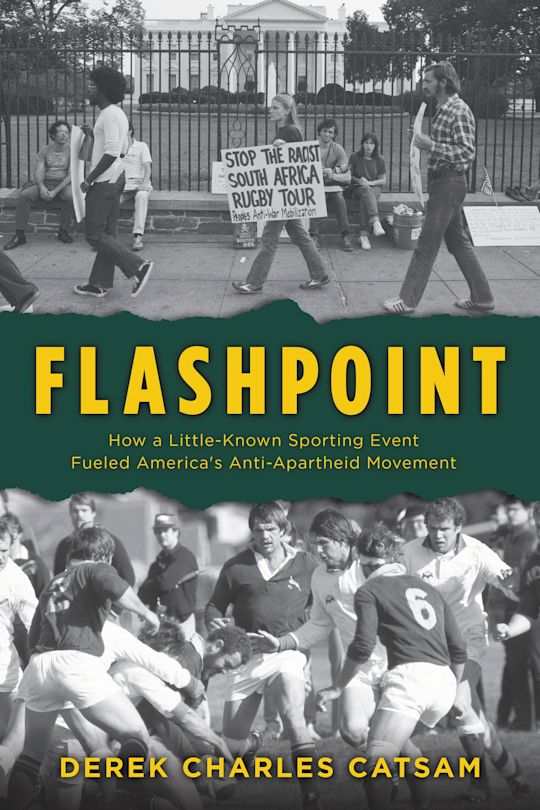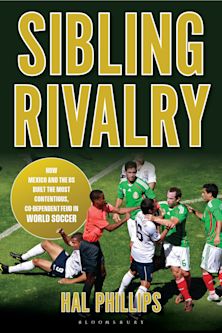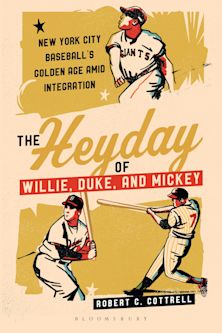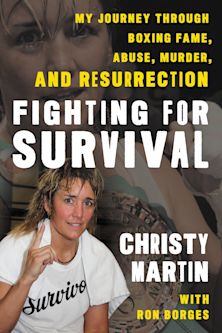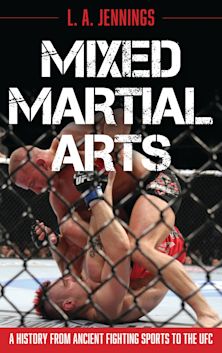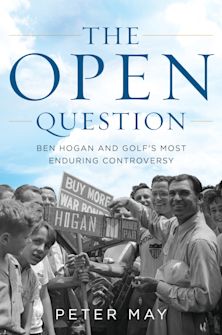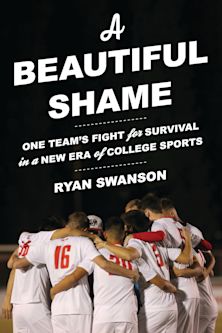- Home
- ACADEMIC
- Sport, Exercise & Games
- Flashpoint
Flashpoint
How a Little-Known Sporting Event Fueled America's Anti-Apartheid Movement
Flashpoint
How a Little-Known Sporting Event Fueled America's Anti-Apartheid Movement
This product is usually dispatched within 1 week
- Delivery and returns info
-
Free CA delivery on orders $40 or over
You must sign in to add this item to your wishlist. Please sign in or create an account
Description
Forty years ago, a South African rugby tour in the United States became a crucial turning point for the nation’s burgeoning protests against apartheid and a test of American foreign policy.
In Flashpoint: How a Little-Known Sporting Event Fueled America's Anti-Apartheid Movement, Derek Charles Catsam tells the fascinating story of the Springbok’s 1981 US tour and its impact on the country’s anti-apartheid struggle. The US lagged well behind the rest of the Western world when it came to addressing the vexing question of South Africa’s racial policies, but the rugby tour changed all that. Those who had been a part of the country’s tiny anti-apartheid struggle for decades used the visit from one of white South Africa’s most cherished institutions to mobilize against both apartheid sport and the South African regime more broadly. Protestors met the South African team at airports, chanted outside their hotels, and courted arrests at matches, which ranged from the bizarre to the laughable, with organizers going to incredible lengths to keep their locations secret.
In telling the story of how a sport little appreciated in the United States nonetheless became ground zero for the nation’s growing anti-apartheid movement, Flashpoint serves as a poignant reminder that sports and politics have always been closely intertwined.
Table of Contents
Preface: Rise up Zwide!
Introduction
Chapter 1: The Accidental Tourists: Planning for the United States Tour
Chapter 2: Starting to Play and Preparing For Battle: The Irish in South Africa, Planning to Resist in America
Chapter 3: Apart Hate: Planning to Resist the Springboks
Chapter 4: The 1981 Springbok Tour to New Zealand: A Country Divided
Chapter 5: Cloaks, Daggers, and Rugby: The Springboks in the Midwest
Chapter 6: Albany I: Facing Off in the Courts and Against the Colonials
Chapter 7: Albany II: The Test Match
Conclusion: The Long Tail of Post-1981 South African Rugby
Bibliography
Index
About the Author
Product details
| Published | Aug 28 2021 |
|---|---|
| Format | Hardback |
| Edition | 1st |
| Extent | 254 |
| ISBN | 9781538144695 |
| Imprint | Rowman & Littlefield Publishers |
| Illustrations | 15 b/w photos |
| Dimensions | 232 x 163 mm |
| Publisher | Bloomsbury Publishing |
About the contributors
Reviews
-
History professor Catsam provides illuminating historical context for recent intersections of sports and political activism in this well-crafted study of the 1981 U.S. tour of South Africa’s national rugby team. The Springboks, who, Catsam writes, “embodied their home country’s white supremacist apartheid policies,” arrived in the U.S. during Ronald Reagan’s first year as president. His administration had adopted a policy of constructive engagement with the apartheid regime, a shift from the approach of Reagan’s predecessor, Jimmy Carter. In fact, the invitation from the United States of America Rugby Football Union to the Springboks was sent on the very day of Reagan’s inauguration. But the prior leg of the team’s tour, in New Zealand, was marked by major protests, and concerns about a repetition in the U.S. led to cancelling matches scheduled for Los Angeles, Chicago, and New York City, whose match was shifted to Albany, despite efforts to cancel it on public safety grounds that made it all the way to the Supreme Court. Through extensive research and interviews—including with members of the team—Catsam assiduously captures how the uproar around the team’s tour primed “the pump of an American anti-Apartheid movement,” ultimately playing a part in the evolution of American policy. This account of an obscure yet impactful moment in history will fascinate sports fans.
Publishers Weekly
-
Catsam's ardent account of the South African national rugby team’s controversial 1981 tour of New Zealand and the U.S. examines the politicization of sport during the apartheid era. Rugby, like every other part of society in twentieth-century South Africa, was racially segregated. By the late 1970s, anti-apartheid pressure meant that the Springboks national team was effectively banned from international competition. But, with the election of Ronald Reagan, who was politically sympathetic to South African regime, advocates for the Springboks saw an opening and charged into it. Meanwhile, a few rugby organizers belatedly tiptoed toward racial integration, and center Errol Tobias became the first person of color to play a test match as a Springbok. The 1981 international tour would be disrupted by protests, civil disobedience, a court case, and a pipe bomb. But it would also lay the foundation for later international engagement, including South Africa hosting the 2010 World Cup. Informed by conversations with key figures and access to records from the South African Rugby Board, Catsam emphasizes the bureaucratic and social challenges of “rugby diplomacy.” His descriptions of the matches themselves reveal a fan’s love for the sport.
Booklist
-
Catsam offers an informative, detailed narrative of how the sport of rugby became entangled with the American anti-apartheid movement emerging in the 1970s and 1980s…. Catsam argues well that there are times when sport cannot be separated from politics—allowing the Springboks to play without protest in the US was just as political as condemning them and the Americans who welcomed them. Recommended. General readers through faculty; professionals.
Choice Reviews
-
Lifts the lid on American collaboration with sports apartheid in a valuable collage of rugby, Springboks, and racism.
Peter Hain, leading anti-apartheid campaigner and co-author with André Odendaal of Pitch Battles: Sport, Racism and Resistance
-
It took four decades for a behind-the-scenes look from an American perspective on the controversial and bloody South African rugby tour of 1981 to New Zealand and the United States. Derek Catsam made it worth the wait.
Heindrich Wyngaard, South African journalist, broadcaster, and author
-
As a player who was part of the 1981 Springbok rugby team that toured New Zealand and the USA, we as sportsmen wanted to contribute to the game—but in Flashpoint, Derek Catsam provides a complete perspective, including the political views that played out in the background. The role of the anti-apartheid movement in America as well as the foreign policy ofthe time is excellently reproduced.
Theuns Stofberg, former Springbok captain and member of the 1981 Springboks team

ONLINE RESOURCES
Bloomsbury Collections
This book is available on Bloomsbury Collections where your library has access.









